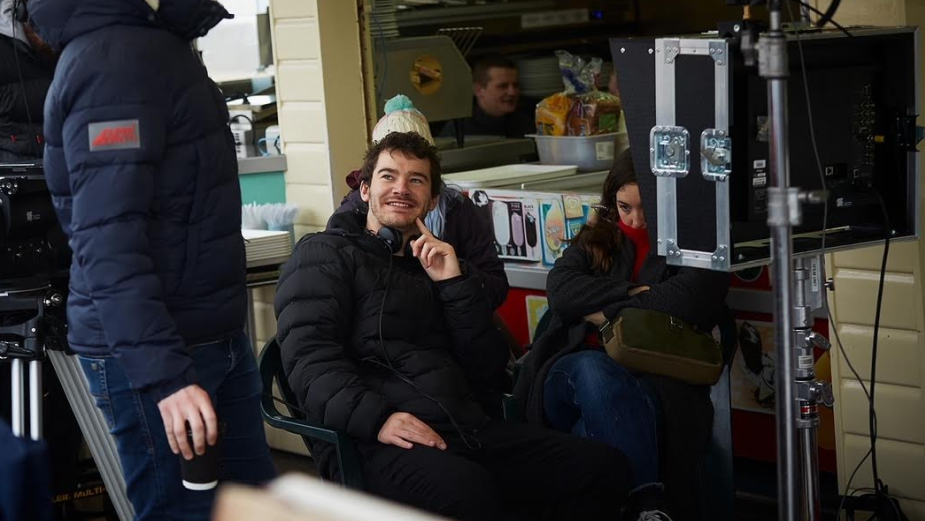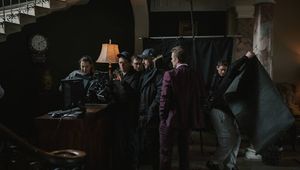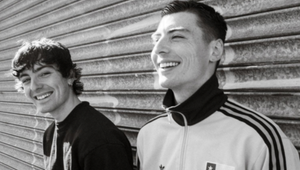
The Directors: Duncan Christie

Duncan Christie is a London-based director working in commercials, music videos and film. Duncan studied film direction at the Arts Institute of Bournemouth, where his first spec commercial for Dove won three Kodak Awards.
Soon after graduating, Duncan was nominated for the D&AD Next Director award for his film 'Power of Play' shot for Chevrolet. Since then, he's worked with some of the top advertising agencies and brands including Amazon, Vodafone, McDonald’s and Breast Cancer Now, picking up awards at The Clios, The APA show, The LIA awards, Epica and The One Show along the way.
Honest, emotive storytelling and a keen visual eye distinguish his work across a range of genres. Outside of his commercial work, Duncan's short films have screened at festivals globally. His most recent short 'Tom' was funded through Creative England and the BFI.
Name: Duncan Christie
Location: London
Repped by/in: Banjoman in Ireland
LBB> What do you like about working with Banjoman? What opportunities are there from being represented by them? And what is the overall philosophy like?
Duncan Christie> I loved the roster at Banjoman, which felt carefully curated and well balanced, so that’s what originally drew me to the company. The fact that every director brings something different to the table but within that there’s a clear overall style and voice.
They have a first class reputation for storytelling work, and on top of that they’re lovely people to boot, so it felt like the right fit in terms of style and culture.
LBB> What are some upcoming projects that you're excited about? Tell us a bit about them?
Duncan> I have got a few projects coming out this year that I’m excited about, but I’m not sure how much I’m aloud to say about those just yet! But the common factor is the focus on an emotional narrative and interesting characters – I’ve been lucky enough to work on some great scripts.
'A moving campaign film, 2050 was commissioned to promote and raise funds for the UK breast cancer charity, Breast Cancer Now.'
LBB> What excites you in the advertising industry right now, as a director? Any trends or changes that open new opportunities?
Duncan> I think we’re starting to see more brands and organisations interested in using longer form content to get their message out there. Producing work that people will engage with proactively. As a storyteller that’s really exciting, as it offers the possibility for more character development. But that said, making a good old fashioned 20 or 30 second TVC is still something I love, trying to express the most in the least amount of time is a challenge I will always enjoy.
LBB> What elements of a script sets one apart from the other and what sort of scripts get you excited to shoot them?
Duncan> Put simply I’m most excited by scripts that are grounded in some kind of truthful insight, regardless of whether it’s product focussed or storytelling driven. It doesn’t even have to be anything massively profound, often the simplest ideas are the best, but I need to be able to relate to the concept/premise on a gut level.
LBB> How do you approach creating a treatment for a spot?
Duncan> Every treatment is different but generally I will let a script germinate, so I might spend a day jotting down ideas as they come to me before I start properly putting pen to paper.
Then I’ll get a first pass down, occasionally it’s great but more often than not I find myself re-writing and re-writing. I need to find the tone, style and approach that is right for that particular story, and often that takes some exploration. As they say, writing is re-writing.
'A touching brand spot that tells the story of a young woman who keeps seeing the same woman alone in McDonalds.'
LBB> If the script is for a brand that you're not familiar with/ don’t have a big affinity with or a market you're new to, how important is it for you to do research and understand that strategic and contextual side of the ad? If it’s important to you, how do you do it?
Duncan> If there’s something I’m unsure about I’ll usually try to ask that question during the briefing call with the agency. Usually agencies understand the client’s history better than directors, so asking the right questions can be invaluable in order to avoid taking a wrong turn and wasting lots of time.
LBB> For you, what is the most important working relationship for a director to have with another person in making an ad? And why?
Duncan> I would say it’s probably with your producer; when it’s working well you become partners in crime and any director is only as good as the producer they’re working with. Plus the whole process becomes infinitely more enjoyable when you work with a producer you really trust, both creatively and from a production point of view.
LBB> What type of work are you most passionate about - is there a particular genre or subject matter or style you are most drawn to?
Duncan> It’s always rewarding to collaborate with brands or charities working to promote social good, particularly when it coincides with a subject you have some first hand experience of. I directed a film for the charity Family Action that is one of my favourite projects, partly because some of the issues the charity tackles have affected me directly.
'Family Monsters was commissioned to coincide with the hundred year anniversary of Family Action, one of the UK’s oldest charities. In this film the issues or ‘monsters’ faced by everyday families are brought to life through a combination of live action and animation.'
LBB> What misconception about you or your work do you most often encounter and why is it wrong?
Duncan> I’m not sure I’m well known enough yet for people to have misconceptions about my work or what a diva I am. Maybe one day!
LBB> What’s the craziest problem you’ve come across in the course of a production – and how did you solve it?
Duncan> I shot a commercial last year for Network Rail that was all set in a railway station. Since the film was going to air during lock down we had a big discussion about whether the characters should wear masks or not in the film. We were going for quite a fly on the wall, naturalistic approach and, given the context in which the film was going to be released, we decided that masks were the only way to go. The challenge then was how to retain the emotion and the connection to the people. In the end we choose to add a few simple but important lines of dialogue, which really brought it all together.
LBB> How do you strike the balance between being open/collaborative with the agency and brand client while also protecting the idea?
Duncan> I don’t tend to look at those two things as being mutually exclusive. Agencies spend months working with a client, getting to understand their needs and developing an idea, so very often they understand the idea and how to protect it in a way that the director sometimes can’t.
However agencies come to directors looking for an approach that is original and idiosyncratic. I think agencies are usually looking for directors with strong opinions but it helps if you have the experience to know which battles are worth fighting.
'Network Rail and charity Chasing The Stigma set out to create a film that would tackle a mental health crisis exasperated by the pandemic.'
LBB> What are your thoughts on opening up the production world to a more diverse pool of talent? Are you open to mentoring and apprenticeships on set?
Duncan> I think making the industry as diverse and inclusive as possible is vitally important for so many reasons and it goes without saying that I ensure the sets I work on reflect that. I also know how important it was to be given a chance when I was just starting out so I will always want to help others just like I was given a hand back then.
LBB> How do you feel the pandemic is going to influence the way you work into the longer term? Have you picked up new habits that you feel will stick around for a long time?
Duncan> It’s been interesting to see how the pandemic has affected casting with everything now being done via self-tapes. One advantage (in terms of UK castings) is that you now get tapes from people all over the country, when in the past everything had been very London centric, so I hope that continues. But now I’m also enjoying being back in the room with actors during casting, on some projects that becomes so important.
LBB> What’s your relationship with new technology and, if at all, how do you incorporate future-facing tech into your work?
Duncan> I love working with pioneers within tech and find collaborations essential here as the world is moving so fast. It’s exciting but for me it’s important the focus is to find the best way of telling a story – not just using new tech for the sake of it.















